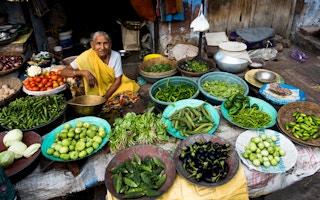Global hunger has been on an indefensible rise for many years, and Asia—home to nearly half a billion of the world’s hungry and more than half of the world’s malnourished children—has not been spared. While global food systems have long been under stress, the Covid-19 pandemic pushed them to their breaking point, and the imperative to act has never been more important.
In a matter of weeks, Covid-19 laid bare the vulnerabilities in global food security, compounding previous levels of hunger with job losses, supply chain disruptions and declines in income. This has had a disproportionate impact on poor and vulnerable communities.
On the supply side, the price of staple food across the region, such as rice and wheat, was driven up by disruptions to production and distribution combined with panic buying. For example, retail prices of rice in Thailand rose about 20 per cent on average in January to April 2020 compared with the same months of 2019.
On the demand side, the pandemic has affected food consumption by eroding household incomes. Those working in the informal sector in the region (almost seven in 10 workers) are at particular risk. Their income is estimated to have fallen 22 per cent in the first month of the Covid-19 crisis, causing relative poverty rates to rise to 36 per cent from 22 per cent before the crisis.
“
Over the past few months, we have been reminded of the critical importance of a strong and functioning food system—one that empowers everyone to access the good food they need to maintain good health, and that sustains the planet’s resources.
Covid-19 has also exposed the risk of poor diets. There is growing evidence that what we eat fundamentally impacts how we experience Covid-19. In one investigation, the odds of hospitalisation were 16 times greater for people with obesity, diabetes or hypertension; 76 per cent of deaths from Covid-19 are among individuals with an underlying condition, many of which are diet-related. Troublingly, the Asia-Pacific region is home to the fastest growing rates of childhood obesity in the world, with children increasingly exposed to cheap and convenient unhealthy processed foods rich in salt, sugar and fat but poor in essential nutrients. This is tragic, and it is preventable.
If we are to change this trajectory, the food systems of the future must be healthy, reliable and equitable. They must balance the need for economic development and increasing demand for food with sustainability and conservation of natural resources. We can’t do this with patchwork improvements. A whole-systems approach is necessary if we are to succeed in transforming the global food system to nourish people and planet.
Fundamental shifts will be required to get there, because what we consume is about much more than daily individual choices of what to eat. Increasing the plate share of healthy foods, and decreasing the share of ultra-processed and nutrient-poor foods, requires action across government, the private sector, food producers and many other food sector actors. Together, we need to tackle challenges as diverse as advancing nutrition research to better understand the costs and benefits of our diets, ensuring our food systems are sustainably powered, growing the capacity of small and medium-sized enterprises to increase availability of healthy foods, changing policies to help communities affordably and equitably access good food, and investing in programmes to help children eat healthier meals. These are a few areas of work we are focused on at The Rockefeller Foundation.
Getting it right will necessitate bold thinking and action, and we are seeing local communities lead the way. That is why we launched the Food System Vision Prize, a global challenge to gather actionable visions from teams around the world on what our food systems can be. They represent the creativity and big ideas we need to nourish all people and sustain the planet into the next century.
Winners hail from around the world, including India and China. Eat Right India, for example, is working to create a national movement towards healthier diets through a systems-based approach of reducing food waste, improving hygiene and sanitation across the value chain, and increasing access to and affordability of healthy foods.
In China, “From Mama’s Kitchen to Metropolitan Beijing” is promoting a shift to plant-based diets through Good Food Hubs, a pilot community centre coupled with a smartphone app. The hub will serve as a kitchen lab, pop-up restaurant, learning centre, resource library and social media studio, which connects eco-farms and communities and nurtures healthy eating habits and nature through the creative use of technology.
Over the past few months, we have been reminded of the critical importance of a strong and functioning food system—one that empowers everyone to access the good food they need to maintain good health, and that sustains the planet’s resources.
To jump-start solutions like those proposed by the Food System Vision Prize finalists, we need dramatic, collective action. This World Food Day on 16 October is an opportunity to reaffirm our global commitment to healthy and affordable diets for all through bold vision and swift action. With a quarter of a billion people facing acute hunger by the end of the year, there’s no time to wait.
This article is co-authored by Sara Farley, managing director of The Rockefeller Foundation Food Initiative, and Deepali Khanna, managing director of The Rockefeller Foundation Asia Regional Office.













